NIH OAR 2023 Workshop for Early Career Investigators in HIV
Speaker Biographies
Opening Remarks
CAPT Mary Glenshaw, PhD, MPH, Office of AIDS Research, NIH
CAPT Mary Glenshaw, PhD, MPH joined the NIH Office of AIDS Research (OAR) in 2019 and is the lead of the OAR Science team as the Supervisory Health Scientist Administrator. Dr. Glenshaw leads NIH contributions to the National HIV/AIDS Strategy and the Ending the HIV Epidemic: A Plan for America initiative, and the HIV implementation science portfolio, and serves as the Executive Secretary of the OAR Advisory Committee (OARAC). Dr. Glenshaw brings global health and epidemiology expertise to the Office from 13 years with the Centers for Disease Control and Prevention (CDC), where she served the President’s Emergency Plan for AIDS Relief (PEPFAR) in various capacities in Southern Africa.
Mentorship Panel
Mallory Johnson, PhD, University of California, San Francisco

Mallory Johnson, PhD is a professor of medicine at USCF school of medicine and licensed clinical health psychologist, whose research has focused on understanding, measuring, and improving the health of patients with chronic diseases such as HIV. Dr. Johnson’s program of multidisciplinary collaborative research is focused on improving HIV treatment outcomes through patient empowerment. His teaching mission is primarily achieved through mentoring of early career investigators. Dr. Johnson is the Director of the NIH-funded Center for AIDS Prevention Studies (CAPS) and Director the CAPS Developmental Core. In 2020, he also took on the role of Co-Director for the UCSF Center for AIDS Research (CFAR), for which he oversees the Developmental Core. Dr. Johnson has received awards and Honors for mentoring and teaching early career investigators.
Carlos E. Rodriguez-Diaz, PhD, MPH, MCHES, George Washington University
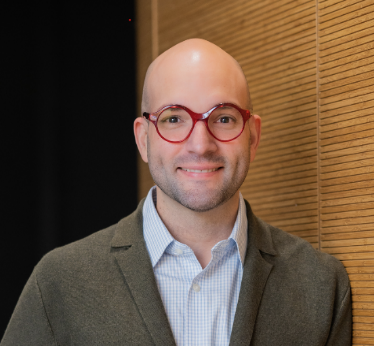
Carlos Rodriguez-Diaz, PhD is an associate Professor, Vice-Chair, Department of Prevention and Community Health, Milken Institute School of Public Health, at George Washington University. He is a native of Puerto Rico, a Spanish-speaker, and an experienced bilingual-bicultural researcher with a background in community health. He conducts community-based participatory research in Puerto Rico, the United States of America, and the Caribbean Region. His work has focused on health equity through actions on the social determinants of health. He has led several programs and research projects addressing health inequities among populations made socially vulnerable, including people with HIV, Hispanic/Latinxs, incarcerated populations, and sexual and gender minority groups. He has several funded projects to develop interventions to enhance HIV prevention services, improve primary care for Latinx and transgender populations, and improve continuity of care for justice-involved people. Dr. Rodriguez-Diaz is the first author of one of the most cited publications about the risk for COVID-19 infection and death among Latinos in the United States. In addition, he is an academic activist and committed mentor. His research and scholarship have led to coverage in well-known national and international media sources such as the Washington Post, The Hill, The Guardian, El Nuevo Día (Puerto Rico), El Mercurio (Chile), and Folha de S. Paulo (Brazil), as well as in research publications and conferences.
Resources Panel
Katherine (Kate) B.Majewski, National Library of Medicine (NLM)
Ms. Majewski is a librarian, trainer and technical writer for the U.S. National Library of Medicine (NLM). She holds a Masters in Library Studies (MLS) from the University at Buffalo, and has worked in libraries for more than 25 years.
Elisabet (“Lis”) Caler, PhD, Office of AIDS Research, NIH

Dr. Caler joined the NIH OAR as a health scientist administrator in September 2019. Before joining OAR Lis served as a Program Director in the Heart, Lung and Blood Institute, Division of Lung Diseases where led the Lung Response to Pulmonary Infections, Microbiome, AIDS and Tuberculosis area, focusing on cellular and molecular lung responses to HIV, tuberculosis (TB), and non-TB mycobacterial infection, as well as other and viral, bacterial and fungal pathogens that cause pneumonia. Currently, Dr. Caler leads the Basic and Translational Science Workstream within the NIH OAR Science Group, overseeing crosscutting areas of research including Vaccine Development, Microbicides and MPTs, HIV Associated Comorbidities, Coinfections and Complications and Research Toward HIV Cure and the NH OAR Early Career Investigators in HIV Initiative. This workshop is part of the effort.
Walid El-Nahal, MD, MHS, Office of AIDS Research, NIH
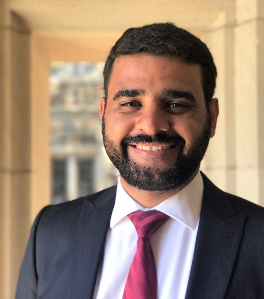
Dr. El-Nahal is an American Association for the Advancement of Science Fellow in the NIH Office of AIDS Research, serving as a member of the Science Team. Dr. El-Nahal is a board-certified Internal Medicine and Infectious Diseases physician, and uses his clinical background in HIV and infectious diseases to support the NIH OAR Senior Science Advisors in advancing critical NIH HIV research priorities. Prior to joining the NIH in August 2022, Dr. El-Nahal completed an Infectious Diseases fellowship at the Johns Hopkins University School of Medicine. In that role, he trained in the clinical care of people with general infectious diseases and those with compromised immunity including individuals with organ transplants and people with HIV. His research interest is in understanding how healthcare policies and healthcare delivery impact clinical outcomes. His latest work centered on how the widespread adoption of telemedicine during the pandemic has impacted engagement in care for people living with HIV. Dr. El-Nahal is devoted to using his research to inform policy, so his work has been published in peer-reviewed scientific journals and presented to academic conferences as well as public health agencies. Prior to joining Johns Hopkins, Dr. El-Nahal trained at the University of Virginia where he completed medical school, three years of Internal Medicine residency, and a year as a Chief Internal Medicine resident, teaching, training, and supervising junior residents.
NIH HIV Program Coordinators and Program Officers
Geraldina Dominguez, PhD, National Cancer Institute (NCI)
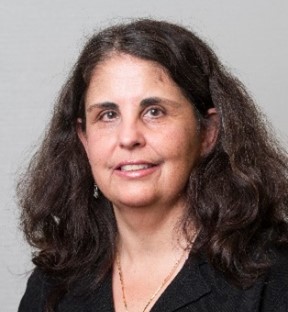
Dr. Dominguez received her BS in Applied Biology from the Georgia Institute of Technology and her PhD from Georgia State University. Dr. Dominguez received a Resident Research Associateship from the National Research Council to study the genetic and genomic structure of human herpesviruses 6,7 and 8 at the Centers for Disease Control and Prevention (CDC) in Atlanta, Georgia. After CDC, she moved to the Yerkes National Primate Center of Emory University to conduct studies on the signal transduction pathways and transcriptional regulation of the CART gene (Cocaine and Amphetamine Regulated Transcript). In 2004, Dr. Dominguez started working at the National Cancer Institute as an International Project Officer in the Office of International Affairs, and in 2005 she accepted a Program Director position in the Office of HIV and AIDS Malignancy (OHAM). Currently, she serves as the Director of the AIDS Malignancy Program in OHAM. Dr. Dominguez plays a major role in developing and managing HIV and AIDS malignancy initiatives, including initiatives that increase research capacity in resource constrained settings. Dr. Dominguez has received two NIH Director’s Awards and one NCI Award of Merit for her role in supporting initiatives that build research capacity in resource constrained regions.
Emmanuel F. Mongodin, PhD, National Heart, Lung, and Blood Institute (NHLBI)
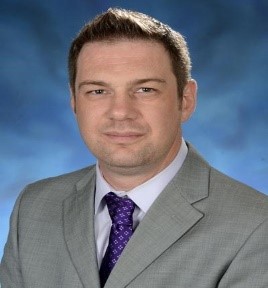
Dr. Mongodin joined the National Heart, Lung, and Blood Institute (NHLBI) in 2020 as a Program Director in the institute’s Division of Lung Diseases (DLD). His primary interests include lung responses to pulmonary infections, effects of the microbiome on the host immune response, and HIV/AIDS. Dr. Mongodin earned his PhD in 2000 from the University of Reims-Champagne-Ardenne in France, where he studied the mechanisms of adherence of Staphylococcus aureus in the airway epithelium. Following his PhD, Dr. Mongodin completed his postdoctoral training initially at VCU (Richmond, VA), then at The Institute for Genomic Research (TIGR ; Rockville, MD) and at the J. Craig Venter Institute (Rockville, MD). Dr. Mongodin was later recruited to the Institute for Genome Sciences at the University of Maryland School of Medicine in 2007, before joining NHLBI in August 2020. Initially trained as a physiologist studying host-bacteria interactions, Dr. Mongodin has since become an expert in large-scale next-generation genomic, comparative genomic and metagenomic strategies to further our understanding of host-pathogen interactions in the context of entire microbiome systems. Dr. Mongodin has co-authored over 120 peer-reviewed publications and served on the editorial board and as reviewer of multiple scientific journals.
Que Dang, PhD, National Institute of Allergy and Infectious Diseases (NIAID)

Dr. Dang is a Program Officer and Contracting Officer Representative in the Preclinical Research and Development Branch, Vaccine Research Program, Division of AIDS, NIAID, NIH. She oversees grants and contracts in both the SIV/HIV and TB fields and work with the HIV Vaccine Trials Network to organize an annual Translational HIV Vaccine Early-Stage Investigator Conference. Interests: innate immunity, pediatric ontogeny, animal models (nonhuman primates and small animals), and HIV/TB co-infection.
Eric Refsland, PhD, National Institute of Allergy and Infectious Diseases (NIAID)
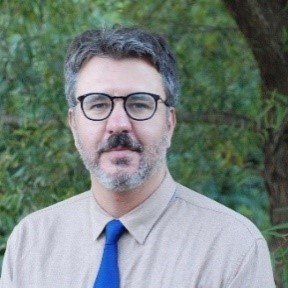
Dr. Refsland is a program officer in the Pathogenesis & Basic Research Branch of the Basic Sciences Program, NIAID Division of AIDS (DAIDS). His grant portfolio covers a wide range of basic molecular biology and innate immunity projects related to HIV. He is the Team Lead for the NIH CFAR Program (CFAR), oversees the DAIDS Institutional Research Training Grants (T32), and is a member of the NIH UNITE Initiative.
Robert Palmer, MS, MSc, National Institute of Allergy and Infectious Diseases (NIAID)
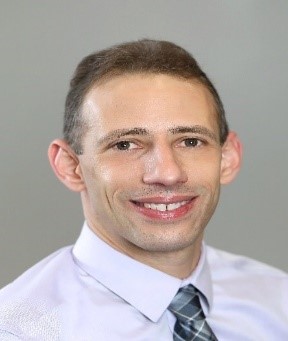
Mr. Palmer is a Health Specialist, Science Planning and Operations Branch, Division of AIDS, NIAID, NIH. He coordinates activities for research initiative development, grant and contract budgeting and have additional responsibilities as a Program Officer and Contracting Officer’s Representative. He also represents NIAID on the NIH AIDS Executive Committee (NAEC).
Robert Freeman, PhD, National Institute on Alcohol Abuse and Alcoholism (NIAAA)
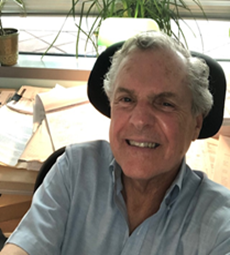
Robert Freeman is Acting Deputy Director of the Division of Epidemiology and Prevention Research at the National Institute on Alcohol Abuse and Alcoholism (NIAAA), National Institutes of Health. At NIAAA, he has overseen the research portfolios in the epidemiology and prevention of alcohol-related violence and alcohol-related HIV/AIDS. He is a member of a number of federal panels devoted to violence prevention, including the Federal Partners in Bullying Prevention, and he has been Guest Editor of several volumes of research devoted to violence prevention and HIV/AIDS issues. He also is the lead author of Handbook for Conducting Drug Abuse Research with Hispanic Populations (Praeger Publishers, 2002), has authored or co-authored approximately two dozen scientific papers in the fields of HIV/AIDS, substance abuse, and sexual violence, and has been a reviewer for the Journal of Urban Health, AIDS Care, Violence Against Women, Journal of Adolescent Health, International Journal of STD & AIDS, and the U.S. National HIV Prevention Conference. Dr. Freeman received his PhD (Urban Sociology) from Fordham University in 1994.
Sonia Lee, PhD, National Institute of Child Health and Human Development (NICHD)

Dr. Lee is the Branch Chief of the Maternal and Pediatric Infectious Disease Branch at the Eunice Kennedy Shriver National Institute of Child Health and Human Development (NICHD). She primarily works with investigators on adolescent HIV prevention and treatment to design and implement behavioral studies and behavioral components of biomedical studies in youth living with HIV or at risk for HIV. Her grant portfolio also includes global research on adolescent HIV prevention and treatment, mobile health for HIV/AIDS, and assessment of neurodevelopmental outcomes. Prior to joining NICHD in 2006, Dr. Lee was a psychologist on the Special Immunology Service at Children’s National Medical Center in Washington, D.C., dealing with assessment and care of children, adolescents, and families living with HIV.
Vasundhara Varthakavi, PhD, DVM, National Institute on Drug Abuse (NIDA)
Dr. Vasundhara Varthakavi (Kavi) is the Associate Director of the HIV Research Program (HRP) at the National Institute on Drug Abuse (NIDA) of the National Institutes of Health (NIH). Kavi is involved in developing the scientific vision, strategic management, implementation, and budgetary oversight of the NIDA’s HIV research portfolio. She plays a vital role in developing, managing, planning and coordinating HIV research programs at NIDA through collaborations with the Office of AIDS Research (OAR), NIH institutes and federal agencies, and the scientific community. Before joining NIDA, she was a Scientific Review Officer at the National Institute of Allergy and Infectious Diseases (NIAID) where she managed reviews of HIV/AIDS-related research grants, career development grant applications, and R&D contract proposals. Kavi was a research faculty in the Vanderbilt Pediatric Infectious Diseases division before coming to NIH. She is a molecular virologist with expertise in HIV assembly and pathogenesis.
Peter Perrin, PhD, National Institute of Diabetes and Digestive and Kidney Diseases (NIDDK)
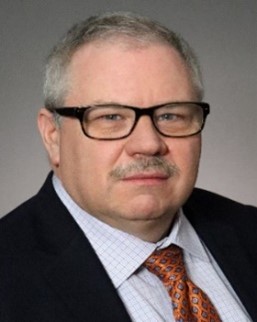
Dr. Perrin has served as NIDDK’s HIV/AIDS Research Coordinator since 2016. In that capacity he works with staff across NIDDK to coordinate the Institute’s HIV Program, which supports research on the intersection of HIV science with NIDDK’s mission. This includes research on several comorbidities and coinfections that are prevalent in people with HIV. These include enteritis and loss of gastrointestinal homeostasis, noncommunicable liver diseases, viral hepatitis, kidney diseases, obesity, diabetes, and other metabolic perturbations. Another area of interest is HIV persistence and reservoir dynamics in NIDDK relevant tissues such as the gastrointestinal tract, liver, male genital tract, kidney and adipose tissue.
Susannah Allison, PhD, National Institute of Mental Health (NIMH)

Dr. Allison is a Program Officer at the National Institute of Mental Health within the Division of AIDS Research. She is also the Training Director for the division and for the Center for Global Mental Health Research. She oversees a portfolio of research and research training grants that focuses on innovative strategies to prevent HIV infection among children, adolescents, and young adults as well as research on how best to enhance the well-being of youth who are living with HIV. She serves as the co-chair of the Sexual and Gender Minority Research Coordinating Committee at NIH. Prior to working at NIMH, Dr. Allison worked with children and families infected and affected by HIV in Baltimore, Miami, and Washington, DC. She completed her doctorate at the George Washington University where she received her PhD in Clinical Child Psychology with an emphasis in child health psychology.
Elizabeth Barr, PhD, Office of Research on Women's Health (ORWH)
Dr. Elizabeth Barr is a Social and Behavioral Scientist Administrator with the NIH Office of Research on Women’s Health (ORWH). Dr. Barr leads ORWH’s efforts to advance intersectional health research on gender as a social and structural variable, coordinates the Office’s interprofessional education program, and leads efforts around HIV and women. Her background is in gender studies, community-centered HIV research, and reproductive justice. Dr. Barr completed her PhD at the University of Wisconsin–Madison and her MS at Towson University. Prior to joining ORWH in 2019, Dr. Barr led interdisciplinary and cross-sector projects to increase women’s engagement in clinical research and served on the faculties of Towson University and the University of Maryland, Baltimore County.
Christopher Barnhart, PhD, Sexual & Gender Minority Research Office (SGMRO)
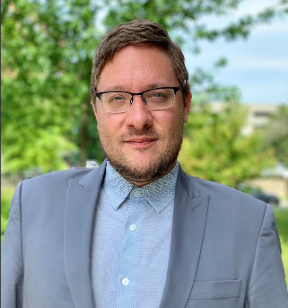
Dr. Barnhart is currently a Health Science Policy Analyst in the Sexual & Gender Minority Research Office at the National Institutes of Health where he supports and promotes the health of sexual and gender minority communities through analysis of relevant grant portfolios, coordination of administrative supplements, engagement with the extramural research community, manuscript and report authorship, strategic planning, workshop execution, and representation on trans-NIH, -HHS, and -federal committees and working groups. He also remains committed to fostering the next generation of scientists through mentorship, technical assistance, and outreach activities. Prior to coming to the SGMRO, Christopher was an AAAS Science and Technology Policy Fellow on detail to the Eunice Kennedy Shriver National Institute of Child Health and Human Development (NICHD), where he analyzed and reported on NICHD activities in supporting and protecting pediatric and maternal health and in addressing relevant health disparities to a diverse array of internal and external stakeholders. Christopher received his doctorate in pharmacology and toxicology from UC Davis in 2015, and then completed a postdoctoral fellowship at the Albert Einstein College of Medicine, focusing at both institutions on how environmental toxicants and individual genetic factors may interact to affect the developing nervous system.
Biao Tian, PhD, Office of Research Infrastructure Programs (ORIP), Division of Program Coordination, Planning, and Strategic Initiatives (DPCPSI), Office of the Director (OD)

Dr. Tian is a Program Officer at the NIH ORIP, within the Division of Comparative Medicine. His portfolio includes the Specific Pathogen Free Macaque Colonies U42 Program and the HIV/AIDS Scholars Program (K01, R21, R13).
NIH Peer Review: Process Overview
David Chang, PhD, Center for Scientific Review (CSR)
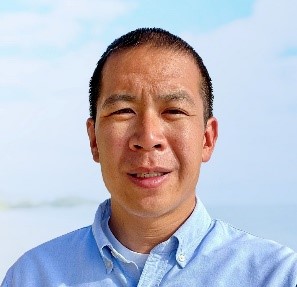
Dr. Chang received his PhD from the Uniformed Services University of the Health Sciences, where he studied connections between the HIV-1 envelope glycoprotein, broadly neutralizing antibodies, and disease progression. In addition, he developed a novel replication-competent alphavirus expression vector based on Fort Morgan virus. He then joined the U.S. Military HIV Research Program, Walter Reed Army Institute of Research, as a research scientist in the Laboratory of Molecular Virology and Pathogenesis, investigating the molecular epidemiology of HIV in Asia and Africa and developing full-genome infectious molecular clones of HIV. He also collaborated in the characterization of CNS compartmentalization during acute HIV infection. Dr. Chang has experience from biotech, focusing on pre-clinical viral vaccine development. He comes to CSR after serving as a Scientific Review Officer at National Institute of Allergy and Infectious Diseases.
Final Remarks
RDML Timothy H. Holtz, MD, MPH, FACP, FACPM, Office of AIDS Research, NIH
Timothy H. Holtz, MD, MPH, was appointed Deputy Director of the Office of AIDS Research (OAR) at the National Institutes of Health (NIH) in June 2019. As Deputy Director, Dr. Holtz provides scientific leadership including policy development and program management for the NIH HIV research program. He works with the OAR Director to coordinate the NIH HIV/AIDS research agenda; directs the development of the scientific components of the NIH Strategic Plan for AIDS and AIDS-Related Research; participates in and convenes expert panels; and coordinates the development of the $3 billion NIH HIV research budget.
Facilitator
Rahel Abebe, MHS, Office of AIDS Research, NIH

Ms. Abebe joined the OAR in 2016. She currently works as a Public Health Analyst, where she supports and coordinates the HIV/AIDS Funding requests from ICOs, workshop execution and various scientific program activities of OAR. Prior to Joining the OAR, she worked for the Division of AIDS (DAIDS) in the National Institute of Allergy and Infectious Diseases, where she served as Health Specialist for the HIV Research Branch (HIVRB). She managed and coordinated non-network funded grants and new initiatives, as well as the Clinical Science Research Committee (CSRC) review process. Ms. Abebe earned her BS in Health Science from York College of Pennsylvania, and master’s (MHS) from the George Washington University, with an emphasis on Clinical Research and Global Health.
This page last reviewed on April 28, 2025

